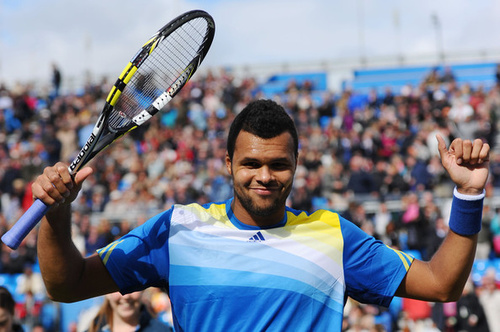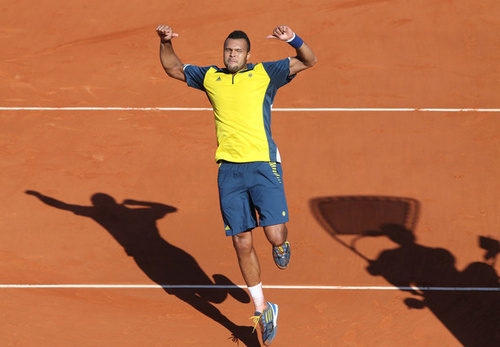Don't miss any stories → Follow Tennis View
FollowATP Predictions for 2014: Jo-Wilfried Tsonga Captures First Major
Matt Tewhatu concludes his series of offseason predictions for the ATP in 2014 with his boldest yet.

Matt’s final prediction: “Jo-Wilfried Tsonga will win his first major title in 2014.”
With the Australian Open on the horizon, few genuine contenders loom outside world No. 1 Rafael Nadal, world No. 2 Novak Djokovic, three-time finalist Andy Murray, and four-time champion Roger Federer. However, after a host of team personnel changes, one player outside that group who may stake a claim for the title is Frenchman Jo-Wilfried Tsonga. After a somewhat underwhelming end to 2013 when he failed to qualify for the World Tour Finals, Tsonga will be targeting the Australian hard-court season where he has been successful in the past.
Since his breakthrough major final at Melbourne in 2008, Tsonga has failed to materialize into the player that the world believes he can become. But, in 2012 and 2013, he has shown that he can match up effectively with players inside the top five at crucial times. For this reason, Tsonga will win his first major title in 2014.
Although enjoying yet another good season this year with a quarterfinal appearance at the Australian Open followed by a semifinal appearance at Roland Garros, Tsonga faded toward the end of the year after succumbing to a persistent knee injury. Until his second-round retirement at Wimbledon, however, there were many positives to be taken out of the year that signal that he has the goods to progress onto bigger things in 2014.
Providing that he can stay fit, often the most demanding task on the ATP circuit, Tsonga will be a major threat to the top five. His quarterfinal victory over Roger Federer at Roland Garros this year showed that he has developed significantly since his younger years. It also showed his ability to perform at his best on the big stage, for there is no bigger stage for a Frenchman than Court Philippe Chatrier in Paris.
Tsonga’s rise has been anything but seamless after making the final at the 2008 Australian Open in just his fifth appearance at a major. Since then, he has perhaps failed to really fulfill his potential. While he signaled his arrival to the world with that initial breakthrough, it is his results in 2012 and 2013 that reflect Tsonga’s true evolution into a player of substance and consistency. Even beyond the Federer victory, he has come close to upsetting the game’s greatest champions, although he has lacked the maturity and the polish to complete the job so far.
Many will suggest that Tsonga’s true coming-of-age happened in his heartbreaking five-set loss against Novak Djokovic in the 2012 Roland Garros quarterfinal, in which Tsonga held four match points. A weak opening set from the Frenchman was preceded by two impressive sets in which Tsonga almost ripped the match away from the No. 1 seed. The Serb held his ground, though, and forced a fifth set that he won in emphatic fashion. Although Tsonga did not win the match, it proved to be a ‘line in the sand’ moment of his promising but stuttering career. In the five majors that he has played since that setback, Tsonga has reached three semifinals.

Still, Tsonga and his team must address the two issues undermining his attempt to become a major champion: mental resilience and consistency. This is no more evident than the 2013 French Open where Tsonga stifled Federer before falling meekly to the ever-consistent but not overpowering David Ferrer a round later.
One can liken Tsonga to a deer caught in the headlights in his semifinal against Ferrer. Against Federer in the quarterfinals, Tsonga hit a meager 22 unforced errors compared with 26 winners. In the semifinal against Ferrer, the opposite occurred. Tsonga donated a whopping 56 unforced errors compared with just 31 winners. Impatience was a key problem as Tsonga looked completely out of his depth in an easy straight-sets win for the Spaniard. What Tsonga must do to become a major champion was illustrated by the contrast between those two performances.
The sounds coming from Tsonga’s team are positive, however, and give every indication that in 2014 the difference between his average performance and his best might not be so great. The appointment of co-coaches Thierry Ascione and Nicolas Escude should aid in ironing out the flaws in Tsonga’s mental durability while adding more variety to his game. Yet there is a tricky balance to strike. While becoming more mentally solid, Tsonga also must retain his carefree demeanor and attitude. It is very much a “live by the gun, die by the gun” scenario, but it is millimeters rather than inches that separate victory and defeat. It is these millimeters that currently puzzle Tsonga.
Tsonga’s game is almost complete. He is capable of sustaining play at a level as high as anyone on the Tour, so it is merely the finer facets of his game that need refining. His new coaching structure and his prolonged break over the off-season will ensure that Tsonga enters 2014 fresh and ready to compete with the top five. His inconsistent, injury-hampered end to 2013 will be a blessing in disguise as Tsonga’s mental freshness and his rested frame will enable him to win his first major title.










